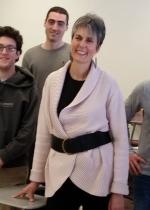Lessons from the Front Lines of Ebola-Ravaged West Africa
February 11, 2015

An IV infusion therapist and registered nurse, Wilson managed a 120-bed treatment facility at the height of the Ebola epidemic in Foya, Liberia, a town on the border with Ebola-ravaged Sierra Leone and Guinea. Under the aegis of Physicians without Borders, she worked closely with a team of nurses (Liberian nationals), implementing an IV therapy protocol to 60 to 80 patients each day. Grim progress during her stay was measured in a patient death rate that declined from 90% to 65%. The good news: no new Ebola patients have emerged in the clinic’s environs since it closed on December 10. In that locale, the trajectory of the virus, she told the students, has run its course.
A registered nurse who lives in Lenox and works for the Berkshire Visiting Nurse Association, Wilson did previous relief work in Haiti and Chad. She is earning a nursing degree at UMass Amherst to complement her first nursing degree, from the Waikato Institute of Technology in her native New Zealand.
“Debbie’s presentation left an indelible mark on us all,” observes Professor Nagurney, who is John F. Smith Memorial Professor of Operations Management at Isenberg. “She demonstrated how one person can change the world. And she made a difference in this course, which prepares students to act decisively in human crises like storms and earthquakes, food shortages, financial contagions, and pandemics.”
In Praise of Logistics
Through her own photos, Wilson illustrated the daunting logistical challenge of erecting and supplying the makeshift tent complex and its infrastructure that was her workplace for six weeks. Medical supplies and equipment were flown in from Geneva and initially trucked and rowed in from Guinea. Following precise guidelines, a plastic mesh fence and ten meters separated the tent housing patients from the rest of the complex. Twice each day, before entering the treatment tent, Wilson and her coworkers dawned bulky suits, including double sets of gloves and goggles, and submit to a head-to-foot chlorine spray [the outfit a life-saving evil in the 100 degree heat].
“I think I’m alive because of the hygienists,” noted Wilson, whose job description expanded to delivering babies, running the clinic’s pharmacy, and “schlepping boxes.” Each day, the hygienists would remove bodies to a makeshift morgue. Daily medical wastes were incinerated in a pit. The clinic drew its water supply from a local river, storing thousands of gallons in an elephant size transparent pouch.
Early on, the medical workers waited days to have blood samples analyzed off site. That changed dramatically “when the logs set up a helicopter pad, and brought in lab equipment and a European lab team,” Wilson recalls. “That reduced test results to less than five hours.”
Cultural Obstacles
Cultural challenges were no less critical, emphasized Wilson. In disseminating preventive and restorative medicine, returning survivors to their homes, and disposing of the dead, outreach and social teams initially encountered resistance in the villages. “At first, when we returned survivors to their homes, they were rejected by their communities,” she told the students. “When we removed bodies from villages, some of their inhabitants thought we were spraying with Ebola itself. Others thought that the disease wasn’t real or that it was a plot by the West.” Much of the population, she explained, remained suspicious of anything espoused by the Liberian government—a legacy of the atrocities of the former president, Charles Taylor.
Americans, she added, have no monopoly on rationality. Witness the excessive confinement and less than welcoming treatment, fueled by politicians, of returning Ebola workers to the United States.
Back in Liberia, Wilson and her colleagues made headway by enlisting those whom they had helped cure to help forge relationships with the village chiefs. Local progress aside, “the public healthcare infrastructure has been destroyed,” she lamented. “The international community must step up in support of these countries.”